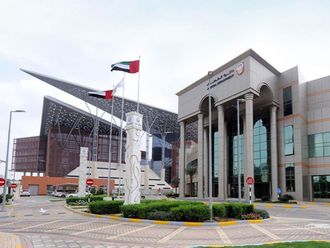Dubai: A police lieutenant has had his three-month imprisonment overturned as a court cleared him of obtaining under duress a Dh105,000 cheque from a businessman after unlawfully detaining him in police confinement following a commercial disagreement.
In May, the Dubai Court of First Instance sentenced the police lieutenant, S.H., to three months in jail after convicting him of confining an Indian businessman, S.D., who had struck a deal with his countryman merchant, I.S., to sell him [I.S.] and his father his trading company for Dh335,000 in March.
The father, N.S., had paid Dh105,000 in cash as a down payment to buy S.D.’s company before he decided to call off the deal. When I.S. and his father asked for their money back, the businessman asked them to wait.
I.S. was also sentenced in absentia for three months in jail for collaborating with S.H. [the lieutenant] to summon S.D. to the police station where S.H. locked up the businessman illegally to coerce him to sign the Dh105,000 cheque and return the money he had taken as a down payment.
However the police lieutenant appealed the primary judgement and sought to prove his innocence before the Dubai Appeal Court. Presiding judge Eisa Al Sharif overturned the three-month jail sentence and acquitted S.H of detaining S.D. without any legal justification and obtaining the cheque from him under duress.
“I did not do anything wrong ... I didn’t abuse my power and I was enforcing the law,” S.H. contended as he defended himself before the appellate court.
Meanwhile S.H.’s lawyer, Ali Musabbeh Dahi, said that his client’s procedures were totally legal and he didn’t abuse his power (as a law enforcement officer) and acted by the book. “The legal procedures that he carried out in this incident were lawful ... as per article 35 of the Criminal Procedures Law. He was protecting evidence and acted lawfully and with good intentions. He didn’t have any bad or criminal intent. My client enjoys a credible and clean record at work and had never breached the law or police’s code of conduct. All he did was try to do what he deemed lawful and just.”
According to the appellate ruling, the lieutenant was cleared for lack of corroborated evidence.
In his statement before prosecutors, S.D. testified that the father visited his company and checked the premises. “Then he gave me the down payment after he agreed to buy the company. Two days later N.S. decided to call off the deal and I asked him for some time to be able to pay him back. I explained to him that I had spent part of the Dh105,000 that he gave me. A week later, S.H. called me and lured me to the police station after he claimed that I had been involved in a traffic accident. I told him that I had my car and I had met with any accident … then he claimed that I had to go to the station. When I went there, I realised that it was because of the deal to sell the company. I explained to him the background of my deal with the merchant and his father, who had decided to call it off. He asked me to pay back the money … but I explained to him that I had agreed with N.S. to give me some time. S.H. then said that I had to pay the money instantly otherwise he would lock me up. When I told him that I did not have the money, he took away my belt and mobile phones, and locked me inside. Later two policemen took me out of confinement and to an office where I was made to sign the cheque,” he claimed.
The next day I.S.’ lawyer contacted S.D. and told him to pay the cheque otherwise the merchant would take legal action against him, said records.
The businessman then discussed what had happened to him with Dubai Police’s Human Rights Section where he was advised to lodge a police complaint.
The appellate ruling against S.H. remains subject to appeal before the Cassation Court.












